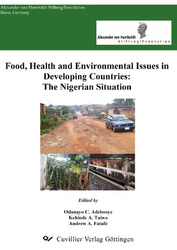| Fachbereiche | |
|---|---|
| Buchreihen (96) |
1381
|
| Nachhaltigkeit |
3
|
| Gesundheitswesen |
1
|
| Geisteswissenschaften |
2370
|
| Medienwissenschaften | 16 |
| Theologie | 57 |
| Philosophie | 102 |
| Rechtswissenschaft | 424 |
| Wirtschaftswissenschaften | 851 |
| Sozialwissenschaften | 418 |
| Sportwissenschaften | 48 |
| Psychologie | 233 |
| Pädagogik | 190 |
| Geschichtswissenschaften | 183 |
| Kunstwissenschaften | 111 |
| Kulturwissenschaften | 166 |
| Literaturwissenschaften | 117 |
| Sprachwissenschaften | 88 |
| Naturwissenschaften |
5408
|
| Ingenieurwissenschaften |
1795
|
| Allgemein |
98
|
|
Leitlinien Unfallchirurgie
5. Auflage bestellen |
|
Erweiterte Suche
Food, Health and Environmental Issues in Developing Countries: The Nigerian situation.
Odunayo C. Adebooye (Autor)Vorschau
Inhaltsverzeichnis, Datei (69 KB)
Leseprobe, Datei (90 KB)
Nigeria, a country in sub-Sahara Africa occupies a total of 910,000 km2 with a population of about 135 million, according to 2007 Federal statistics. Over 90% of foreign exchange earnings come from crude oil (petroleum) export while more than 60% of the population lives in the rural areas and practice subsistence agriculture. Average life expectancy is 47.4 years, with 46 years for male and 48 years for female. Recent statistics (World Bank) have shown that over 70% of Nigerians live below poverty line, on less than one dollar ($1) per day. Over 70% of the population is classified as poor, with 35 % living in absolute poverty. Infant mortality rate is put at 95.5/1000 while the under-five mortality rate is about 191/1000. Poverty is especially severe in rural areas, where social services and infrastructure are limited or non-existent. The great majority of those who live in rural areas are poor and depend on agriculture for food and income.
As a result of the inadequate access to healthcare, poor nutrition, poor water and pollution, Nigeria children are prone to malaria, respiratory, gastrointestinal and several other diseases outbreak. A high proportion of rural people also suffer from malnutrition and other diseases related to poor nutrition. The HIV/AIDS pandemic has also taken a heavy toll among the rural population. As the population grows (based on projection), people will try to obtain higher output (food, water) from heavily used natural resources which eventually will lead to land degradation, poor soil, fresh water scarcity, increased pollution and general breakdown of social and environmental balance. The net effect will be a total decline in Nigeria’s capacity to expand food production and subsequently inability to sustain the well being of the citizenry.
Therefore, research on food, health and environmental issues is of major importance for developing countries. This peer-reviewed publication provides an overview of current Nigerian research projects on these topics. The book, containing peer-reviewed articles, is based on an Humboldt International conference, which took place at Obafemi Awolowo University in Ile-Ife, Nigeria, in August 2008 and which was mainly sponsored by the Alexander von Humboldt Foundation, Germany.
| ISBN-13 (Printausgabe) | 3867277710 |
| ISBN-13 (Printausgabe) | 9783867277716 |
| ISBN-13 (E-Book) | 9783736927711 |
| Buchendformat | A5 |
| Sprache | Englisch |
| Seitenanzahl | 496 |
| Auflage | 1 Aufl. |
| Band | 0 |
| Erscheinungsort | Göttingen |
| Promotionsort | Bonn |
| Erscheinungsdatum | 01.12.2008 |
| Allgemeine Einordnung | Dissertation |
| Fachbereiche |
Sozialwissenschaften
|








